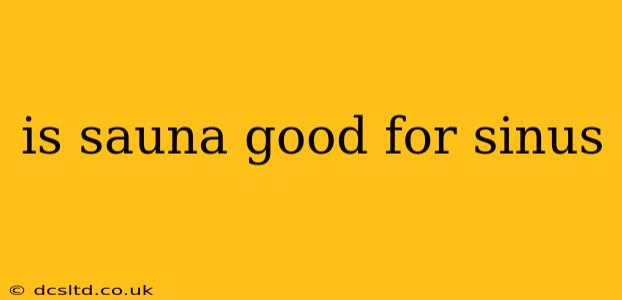Sinus congestion can be incredibly uncomfortable, leaving you feeling stuffy, headachy, and generally miserable. Many people turn to various remedies for relief, and the sauna has emerged as a potential option. But is a sauna actually good for your sinuses? The answer isn't a simple yes or no, and depends on several factors. Let's delve into the potential benefits and drawbacks of using a sauna for sinus relief.
How Does Heat Affect Sinus Congestion?
The primary mechanism by which a sauna might help with sinus congestion is through the generation of heat and humidity. The heat can help to:
- Thin mucus: Increased heat can reduce the viscosity of mucus, making it easier to drain from your nasal passages. This can provide temporary relief from that stuffy feeling.
- Open nasal passages: The heat and humidity can help to relax the tissues lining your nasal passages, potentially widening them and improving airflow.
- Promote sweating: Sweating helps to flush out toxins from your body, which may indirectly contribute to a feeling of better overall well-being, though it won't directly impact sinus congestion.
Does Sauna Therapy Help with Sinus Infections?
While a sauna might offer temporary relief from the symptoms of sinus congestion, it's crucial to understand that it is not a cure for a sinus infection (sinusitis). Sinusitis is usually caused by a bacterial or viral infection, and requires medical treatment like antibiotics or antiviral medications in severe cases. A sauna can alleviate some symptoms, but it won't address the underlying cause of the infection. Using a sauna for a sinus infection without proper medical attention could potentially worsen your condition.
What are the Potential Risks of Using a Sauna for Sinus Congestion?
While generally safe for healthy individuals, there are potential risks associated with sauna use, especially for those with pre-existing health conditions:
- Dehydration: Saunas can cause significant fluid loss through sweating. It’s crucial to stay well-hydrated before, during, and after your sauna session to avoid dehydration, which can exacerbate sinus symptoms and lead to other health problems.
- Increased heart rate and blood pressure: The heat from the sauna can increase your heart rate and blood pressure. This can be particularly problematic for individuals with heart conditions or high blood pressure.
- Worsening of certain conditions: People with certain respiratory conditions, such as asthma or chronic obstructive pulmonary disease (COPD), might find that the heat and humidity worsen their symptoms.
- Burning: Be cautious about the temperature of the sauna and avoid prolonged exposure to excessive heat to prevent burns.
Can I Use a Sauna with a Cold or Flu?
Using a sauna with a cold or flu is generally not recommended. The heat can cause further dehydration and might strain your already weakened respiratory system. It's essential to consult with a healthcare professional before using a sauna if you have any respiratory illness.
What are Other Ways to Relieve Sinus Congestion?
While a sauna can offer some temporary relief, several other methods can effectively alleviate sinus congestion, including:
- Drinking plenty of fluids: Staying hydrated helps to thin mucus.
- Using a saline nasal spray or rinse: This can help to clear out nasal passages.
- Using a humidifier: Adding moisture to the air can help to soothe irritated nasal passages.
- Over-the-counter medications: Decongestants and pain relievers can provide temporary symptom relief.
Conclusion: Sauna and Sinus Relief – A Balanced Perspective
A sauna can offer temporary relief from some symptoms of sinus congestion by thinning mucus and opening nasal passages. However, it’s not a cure for sinus infections or other respiratory illnesses. Always consult with a healthcare professional for diagnosis and treatment of sinus issues. Using a sauna should be approached cautiously, prioritizing hydration and avoiding excessive heat exposure. Combine sauna use with other effective remedies for comprehensive sinus relief. Remember, a sauna session should be a supplementary approach, not a primary treatment, for sinus problems.
